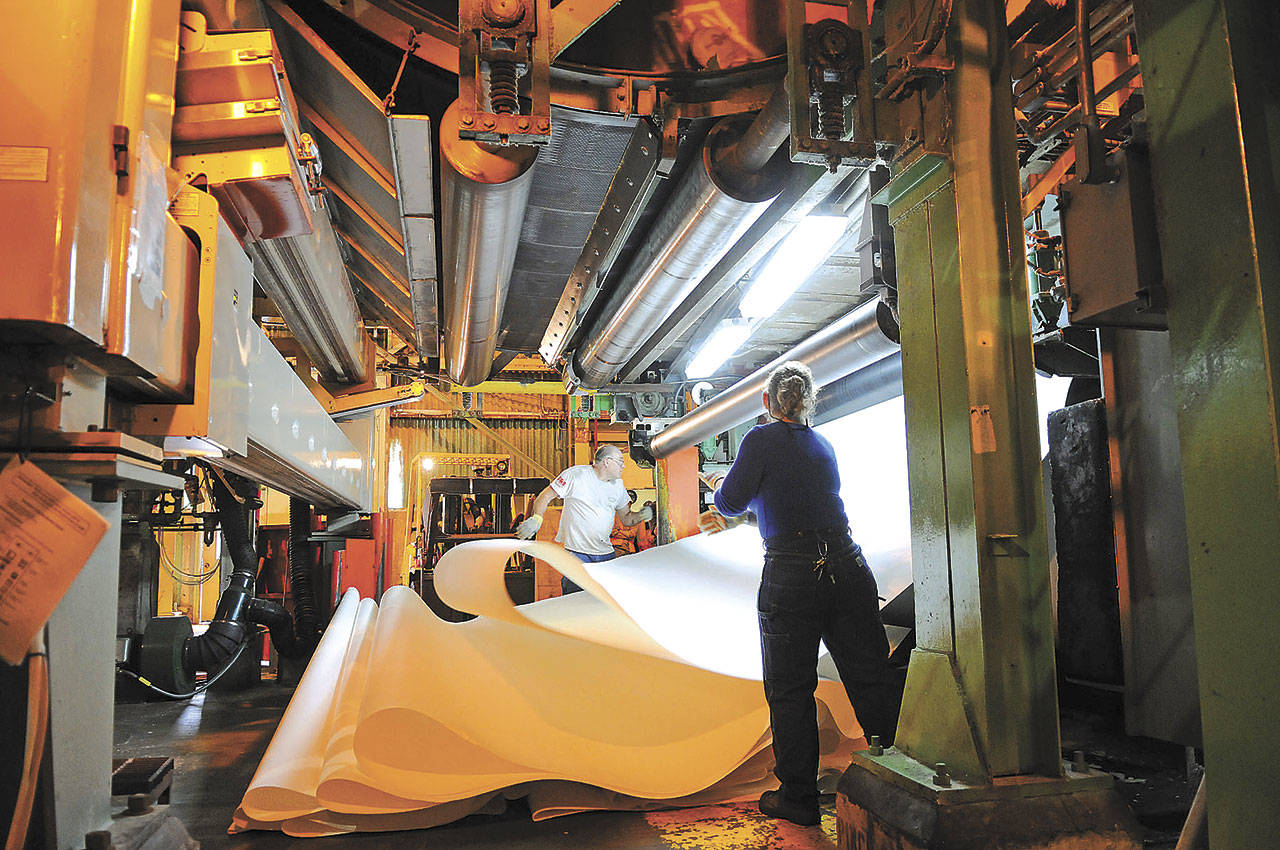By Hal Bernton
The Seattle Times
The Cosmo Specialty Fibers mill runs 24 hours a day to turn Olympic Peninsula wood chips and logs into pulp for rayon fiber manufacturers. For seven weeks, this output has been piling up in warehouses due to an epic market implosion in China, where major customers have been largely unable to operate amid efforts to combat the novel coronavirus.
This is a big financial setback for one of the largest employers in Grays Harbor County. Mill owners have pared back spending and hope to avoid layoffs in a nearly 200-person workforce.
“It’s potentially as catastrophic as anything this business has seen,” said Nick Dottino, the company’s chief executive.
Though the Seattle area has emerged as the center of the nation’s outbreak of the coronavirus and the disease it causes, COVID-19, some of the earliest and harshest economic blows have hit more rural parts of the state, where companies whose fortunes are tied to China have been struggling for weeks amid slumping sales.
Those stung by the virus include the Cosmo mill, which relies on China for 95% of its sales, and some seafood producers who sell to China’s food and restaurant industries. For these businesses, sales nose dived back in January, when the Chinese government, after announcing the initial detection of a new coronavirus, launched sweeping nationwide measures to slow its spread that kept workers away from manufacturing plants and customers out of restaurants.
Their financial problems are part of a much broader fallout from the virus that has hit a multitude of U.S. companies that do business with Chinese companies. And the slowdown in trade, which has spread to other Asian countries along with the coronavirus, also has resulted in a downturn of freight moved through the air and seaports.
“It is always supply and demand, and they (vessel operators) are just pulling ships out because there is just not any cargo to put on,” said Zack Thomas, operations service manager for the Northwest Seaport Alliance, which includes the ports of Seattle and Tacoma.
Thomas said the magnitude of the February downturn is not yet clear because a monthly analysis has not been completed.
Shellfish sales hit
For Pacific Northwest companies that process seafood from Alaska and Washington, countries in Asia have long provided key markets for salmon, crab and many other products. And as the coronavirus has spread from China to Japan, major consumer seafood markets have been increasingly on edge. Just last week, concerns about the coronavirus prompted the postponement of a Boston seafood show that is one of North America’s big industry events.
In Washington seafood’s industry, the coronavirus has had the biggest impacts on companies that ship shellfish to Chinese restaurants and markets.
Shelton-based Taylor Shellfish Farm has let go 40 of its 700 workers employed at a network of aquaculture operations that produce oysters, mussels, geoducks and Manila clams. This company is run by the Taylor family, whose members involved in the business have taken a 20% pay cut, according to Bill Dewey, a spokesman for Taylor, which is the state’s biggest shellfish producer.
Dewey said that Hong Kong is a major distribution hub for his company, and that political unrest last year already caused a steep decline in sales. Then, the coronavirus added “insult to injury.”
The coronavirus also has slammed Seattle Shellfish, which focuses on geoduck for Chinese markets.
Since early February, company president Jim Gibbons said he has had to lay off 60% of more than 60 workers he employed back in January. Even if sales prospects improve, the cancellation of air traffic between Washington and China has made it very difficult to ship the geoducks to fresh seafood markets, and demand also is down in U.S. seafood markets that buy geoducks.
“There is a long ways to go before things get better,” Gibbons said.
Uncertain future
Other Washington exporters are more hopeful that some of the Pacific Rim trade could start to increase in the weeks ahead. They note that new cases of the coronavirus in China have been on the decline even as they continue to climb in the United States, and the Chinese government is encouraging workers to return to their jobs. And in China’s ports, shipping activity is picking up.
“My personal sense is that the worst is likely over,” said Dottino, the pulp mill’s chief executive, who says he is starting to get a few inquiries about possible orders.
But the timetable for any significant rebound in trade is uncertain, and another unknown is the price that customers will pay amid global uncertainties about the course of the coronavirus.
Dottino’s company purchased the Cosmo pulp mill from Weyerhaeuser in 2010, and has been producing a high-grade pulp used to make rayon, a textile fiber, that has been exported in some 5,000 containers annually through the Port of Tacoma. The mill feedstock comes from the wood chips produced by sawmills as well as low-grade logs pulled from forests.
The company’s average wage — $38 an hour according to Dottino — is nearly double the county average. In the years ahead, the company hopes to expand the workforce to produce ethanol, a biofuel, from wood products.
But Dottino says that survival depends on a return to profitability, and the company is looking to state government for help.
Under legislation approved by the state Senate, up to $3 million dollars would be put in a state “strategic reserve account,” money that Dottino hopes would be transferred to a local government in Grays Harbor County to help his company maintain operations.
“We’re open to a loan or a grant,” Dottino said. “Without the coronavirus, we would not be in this situation.”


